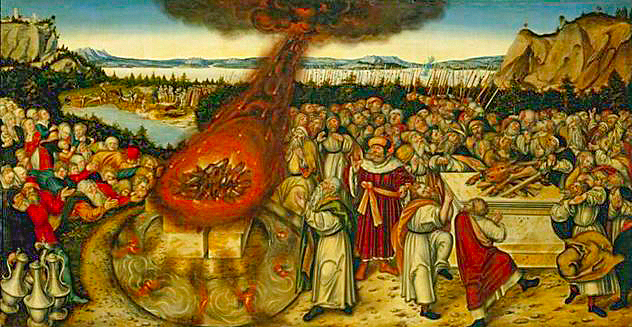
The Blog
A Faithful Remnant Requires Faithful Leadership
Thursday, October 2nd, 2025
“8 And I heard the voice of the Lord saying, “Whom shall I send, and who will go for us?” Then I said, “Here I am! Send me.” 9 And he said, “Go, and say to this people:
“‘Keep on hearing, but do not understand; keep on seeing, but do not perceive.’
10 Make the heart of this people dull,
and their ears heavy,
and blind their eyes;
lest they see with their eyes,
and hear with their ears,
and understand with their hearts,
and turn and be healed.”
11 Then I said, “How long, O Lord?”
And he said:
“Until cities lie waste
without inhabitant,
and houses without people,
and the land is a desolate waste,
12 and the Lord removes people far away,
and the forsaken places are many in the midst of the land.
13 And though a tenth remain in it,
it will be burned again,
like a terebinth or an oak,
whose stump remains
when it is felled.”
The holy seed is its stump. [Isaiah 6:8-13]
The time of the Prophet Isaiah was a pivotal turning point for the nation of Israel, especially the beginning of his decades-long ministry. A long period of peace and prosperity served as the shiny fig leaf covering up a rotting and apostate culture that seemed good on the surface, but was being hollowed from the inside out.
King Uzziah had reigned for more than 50 years, and while “did that which was right in the eyes of the Lord” [2 Kings 15:3], like many men in our own recent times, while he was good, he still fell short. And he fell short because like so many men today, Uzziah didn’t go all the way to what God was calling him to. He, along with his son and co-regent Jotham, played it safe, he compromised, and he tried to be nicer than God.
We see just how in 2 Kings 15:
“32 In the second year of Pekah the son of Remaliah, king of Israel, Jotham the son of Uzziah, king of Judah, began to reign. 33 He was twenty-five years old when he began to reign, and he reigned sixteen years in Jerusalem. His mother's name was Jerusha the daughter of Zadok. 34 And he did what was right in the eyes of the Lord, according to all that his father Uzziah had done. 35 Nevertheless, the high places were not removed. The people still sacrificed and made offerings on the high places”
The “High Places” mentioned here were just that: Places throughout Israel on various hills and other high ground where the people built altars to sacrifice to God. But back in Deuteronomy 12, God makes it clear that the people’s worship should be centralized, unified, especially places that had previously used to sacrifice to other Gods [Deut. 12:1-12]. And once Solomon finished the Temple, all corporate worship was to take place there.
Failure to confront the High Places was a recurring problem throughout the Old Testament, as many kings came and went, and most left them alone. And over time, down the slippery pagan slope these High Places tumbled, becoming more corrupt, until they were being used for heinous and perverse practices, including bloody child sacrifices to demon gods. But pressured by their cowardly and compromised people, the kings became cowardly and compromised themselves, avoiding complete obedience, and instead, settling for incomplete obedience – which is no obedience at all. And so, the High Places in their midst persisted, becoming more evil and more entrenched. Sound familiar?
“Sacrifices and offerings are meaningless when the people continue to be unfaithful to their covenant with God,” Professor Rick Hess of Denver Seminary writes in his textbook, The Old Testament.
This is the scene the Prophet Isaiah steps onto: A prosperous and apostate nation eroding just under the surface, compromised by its own cowardly and lazy incomplete obedience. Sound familiar?
And so God sends Isaiah, a man called not to be winsome or nuanced; not to avoid saying hard things; and not a man to step lightly lest he offend. No, instead, whereas the people he prophesied to were content with only partial obedience, Isaiah, upon seeing the Lord’s glory, chose full and complete obedience, come what may.
Isaiah not only indicts an apostate people, but also their apostate leaders, who’ve either led in the apostasy, or at the very least, allowed it to take root and spread its infection throughout the land. The prosperity comes to an end at the hands of the encroaching Assyrian pagan nation, which God uses to judge his people with the spanking they’ve earned. It’s a brutal and devastating time of upheaval and ruin.
And yet … despite the destruction, despite the ruin, despite the divine spanking … the grace and mercy of God shines through. While we modern judge everything by their immediate emotional impact, God works much differently.
We’ve been conditioned by our comfy suburban, KLOVE-soft, seeker-sensitive churchianity to evaluate our worship through false lenses. Instead of a humble heart willing to receive hard truths, we come with hard, stubborn, self-centered hearts unwilling to even consider truth because of how corrupt our suburban softness has made us. And so, long before we ever even consider “Is it true?” we first run reflexively screaming to “How did it make me feel?” This is how so many High Places now exist in the American Church, and I imagine it was similar in Isaiah’s day. Many churches and institutions that once glorified God, are now woke shells of their former selves, mostly because people don’t want to go all the way, because that means tearing down the things we don’t want to let go of; or, confronting someone we might be afraid of. And so we cling to our incomplete, our partial obedience, choosing cowardly comfort over faithful complete obedience.
And what becomes of those who seek complete obedience? What happens to those daring to confront and tear down High Places? They are the ones torn down, not the High Places. Darkness hates light, but most would rather allow darkness to fester in the midst than confront it, saving instead their courage to confront the brave few willing to shine light into the darkness. The cancer may be killing us, but we seem much more willing to scream at the hand holding the scalpel than at the cancer itself.
And not much has changed since Isaiah’s day. After all, the Prophet most quoted by Jesus Himself was, for all his brave, faithful trouble, reportedly sawn in half by a later King who probably didn’t like Isaiah’s offensive tone. Sound familiar?
And so like then, what is needed now is a healthy pruning of the people, and men willing to wield sharp sheers:
Then I said, “Here I am! Send me.” 9 And he said, “Go, and say to this people:
“‘Keep on hearing, but do not understand;
keep on seeing, but do not perceive.’
It will not be easy; it was not then, perhaps even less so now. Itching ears and discontented grumblers are everywhere, and their bag of undermining tricks and manipulation are everywhere. Gossip, false narratives, gas lighting, shaming, guilt … all the usual impediments of the Longhouse. The High Places must not be offended; but apparently, God and His faithful can be.
And yet, God is faithful. The compromised scheme, destruction may come, but a faithful remnant led by few faithful leaders will endure.
11 Then I said, “How long, O Lord?”
As long as it takes, O men of God. But are we willing? Do we have the requisite will? Do we truly have spines of steel, thick skins, and soft hearts? Take it from me: It can be absolutely exhausting. You will falter, fail, and make mistakes – I know I have. But what is the Kingdom worth? What are we willing to do for eternity?
And it seems to me that we only have two choices, though desperate we may be to cling to a middle way that no longer exists (and in fact, never really did): We can either rise up to confront the High Places all around us and support those leading that glorious work, or, we can among those judged and spanked by God’s consuming, cleansing fire:
13 And though a tenth remain in it,
it will be burned again,
like a terebinth or an oak,
whose stump remains
when it is felled.”
The holy seed is its stump.
Like Isaiah’s day, we too sit at this pivotal moment; and like in Isaiah’s day, we must not make the same mistake of so many. Decay is all around us, and the High Places are now strongholds, and they are Legion. The nice, soft, inoffensive nuance of yesterday will not do; this is war. We must be strong, we must be clear, and we must not falter. We must prune a faithful remnant, leading faithfully all the way, not because we’re mean and unloving, but exactly the opposite – because we love God, and because we love His and our people.
May a faithful generation now rise, in the spirit of Isaiah. May it be, O Lord.
Chris Goble is the Lead Pastor of Ridgeline Community Church, in beautiful Castle Rock, CO. A former teacher, combat vet, and ex-cop, he strives to leverage his diverse experiences for the glory of God by leading with bold clarity, and preaching with the same. A graduate of Westmont College and Liberty University’s Rawlins School of Divinity, he lives with his family in the suburbs south of Denver, CO. You can following Chris on X, or reach him at chrisgoble04@gmail.com



